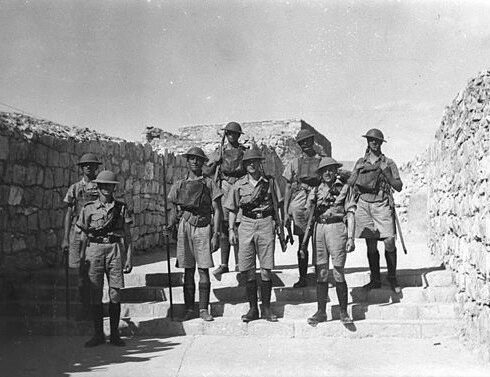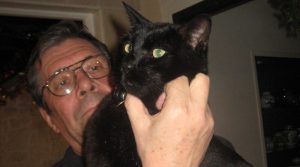Hello, Sweetie!
Reading Time: 9 minutes
"A story about a very special, loving lady, who made a huge impression on me when I was a child." - Allen Ansell She would say, ‘Hello, Sweetie!’ Behind her glasses there was a lovely twinkle in her eye. I was too young to recognise what it meant. Touch wood, when I was younger I never had the feeling there was anything about my body that displeased me: It didn’t matter much how it performed – just as long as there wasn’t blood issuing forth. All kids are the same about blood, a scrape or a fall is tolerable just as long as when you look at where it hurts there is no sign of the red stuff. But she? She most definitely had reason to complain. Yet not once did she ever do so. I can hear her now, ‘Come and sit by yer… ‘ she’d say, then pat the counterpane beside the chair which was permanently alongside her bed. And that is the point of this wonderment I have about her. I can remember her voice almost as if she is in the room with me now; its lilting Welsh accent – the valley accent they’d call it, back there, where much of my family come from. But it was more than wonderment, it being her voice. You see, I can’t classify my memory as being something of my body: It can’t be seen, and comparisons about it can only be made subjectively. But I have to confess it is something which displeases me because my memories don’t seem good enough; don't have enough detail. I wish I had a photographic memory so that I could recall even more of that enchanting time! In my mind’s eye, I’m confused about the layout of her cottage. This is because I was to gain intimate knowledge of that cottage many years later. Today, to get to where her bed was, you would enter through the kitchen door, and move on into the only other downstairs room – the one with the staircase in it – and there, tucked neatly beside the staircase, was her single bed. However, in my mind’s eye, back then, the front door did not lead into the kitchen. Instead, it led directly to her bed. Sadly, there is no one left alive who could verify that it has, or has not, changed in the way my mind tells me. So what of this wonderment, this enchantment, then? She smelled of home. It was a warm, sugary, creamy-soft smell. Perhaps there was a hint of vanilla in her perfume? If I didn’t know better, I would have said that it was a very motherly smell. And she always seemed … soft. Yes, I know that these are hardly picture forming descriptions, but they are the ones that are painted indelibly in my memory. The sense of softness about her, is highlighted for me by the fact I always seem to remember her wearing a soft, pink, knitted, fluffy bed jacket. The jacket was worn over an equally soft nightdress made from brushed cotton. She was as skinny as a rake. Her frail wrists appearing pale and sinewy from under the sleeves of her nightdress. And she had soft, gentle hands, with very long, perfectly manicured, artistic looking fingers; fingers that would hold a book, or my hand, as if it were the most fragile and important thing in the whole wide world. I remember it was my dad who taught me the importance of hands. His were well manicured. He showed me how to push back the quick at the bed of the nails with a thumbnail. It used to hurt. Still does. But he instilled in me that it was important part of grooming. For most of my adult life people people have remarked about my hands, of my nails, which are a shade longer than the average man’s and always well manicured, and as I say, hers were too. For a young boy, of six or seven, having any female wanting to give you a kiss, was to be endured only under duress. Like the kiss of aunt Lizzie, with her whiskers tickling the side of my cheek - her kiss was worst of all! But manners told me to only wipe the cold and slimy area with my sleeve when I was well out of her sight! When Miss Colebrook kissed me however, there was need for much more compliance, much more cooperation; because she being bed-ridden, and so immobile, it was necessary for me to do almost all of the work of a kiss; stretching over the edge of her bed and maneuvering my cheek towards her lips. And, wonderment again, I didn’t shrink away from her. Far from it. I actually found her kiss hello and her kiss goodbye as enjoyable a part of visiting her as our shared love of reading. Though I didn’t realise it then, I loved her. And what I didn’t recognise, all those years ago, through the eyes of a young child, was that the twinkle in her eyes was a sign that she loved me too. ‘Can I go and play with Miss Colebrook?’ I would ask, whenever we holidayed at Pennar House. Sometimes the answer was an immediate affirmative, but more often I was made to wait around while she was made ready for her day. I don’t remember if she had a nurse who visited, or whether some neighbour aided her. A child doesn’t ever think of the practicalities of a life such as hers. I would simply sit down, near the door – ready for a quick escape when the time came – and impatiently start turning the pages of a book that I planned we would both read; not actually reading anything, sometimes just moving ahead through the story to a point where there was an illustration of some kind or another, and then quickly closing its pages for fear of learning something of the story out of place. My great aunt Jessie’s home, Penner House, was like a magnet to my grandparents; it was where we would stay when they took their annual or biannual trips back ‘home’ to the valleys. To Newbridge. They weren’t times that were particularly memorable to me for their fabled greenness; what I remember most, was my fascination of the great buckets of slag that swung from overhead cables. Their contents moving ever upwards from the coal mines, destined to be spilled high up at the very peak of the enormous grey slag heaps that overshadowed everything as we approached our village. I would look out for those overhead cableways through the car's windows as neared our destination, their appearance would tell me that we would soon be there... and maybe we’d be in time to go see Miss Colebrook before tea. She lived next door to aunt Jessie in the cottage that is called ‘Ty Pennar’. Was it by magic that when I arrived by her bedside she would have some book or story ready to grab my interest? I don’t remember the passing of Miss Colebrook. I’m sure it must have happened some time when I was back in London. No one ever told me she was gone. Maybe this was the adults way of sparing me any grief for the loss of someone special? She simply was never there again; never there to read to me, never there to kiss me hello and goodbye. Never there with her welcome, "Hello, Sweetie!" To some extent, after her demise, aunt Jessie became the focal point of my visits to the Rhondda. She had been the headmistress of the village school, and had specialised in art. So there were always paints, paper and brightly coloured crayons available. But her love was harder than Miss Colebrook’s. Aunt Jessie could freeze you solid with one of her well practiced stares. But, underneath her stern exterior, there lay a heart that truly loved children. The change in those visits was mirrored by the fact that, inevitably, I changed too. I was growing up. I began to prefer the company of my mates during school breaks, and I seem to recall a girlfriend or two whose existence helped sway me from missing out on trips back to the valleys. It was a very long time before I returned. It was after my father died. And it was prompted by a peculiar twist of fate: one where my widowed mother moved back to the village and bought what had all those years before been Miss Colebrook’s cottage, Ty Pennar. Aunt Jessie still lived in the big house next door, and when we stayed with my mother, my own two daughters were the ones asking if they could go out to play with someone – and that someone, was aunt Jessie. She still had copious supplies of art material with which to entertain inquiring young minds. I read a biography not so long ago, and the biographer discovered late in Life that she had been brought up by an 'imposter' - her real biological mother was someone with whom, for a relatively short while, she had had a mutually loving relationship with. She had no knowledge that the woman who brought her up was in fact a pseudo-mother - if you like an imposter - who kept the secret of her real mother away from her until after her death, when it was revealed in the reading of her Will. As a child she had experienced a tumultuous relationship with the pseudo-mother. Had it not been for my relationship with Miss Colebrook, I would never have been able to know what those experiences would have felt like. © Allen Ansell 2005, 2023







Thoughtful and wonderful poem.
You can certainly see your writing skills in your work. All the time go after your heart.
Hi there, I discovered your website by means of Google, it seems great. I've bookmarked it in my google bookmarks.
Thanks for sharing!
I am genuinely thankful to the holder of this website who has shared this .